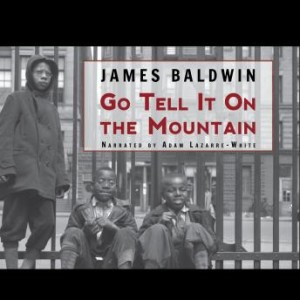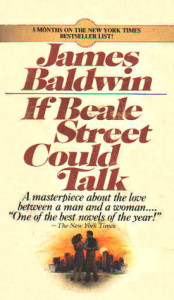
In this debut novel, described as semi-autobiographical, we meet John Grimes on the morning of his fourteenth birthday. It’s a Saturday, but he is consumed by thoughts of the family’s Sunday routines, dominated by attendance at the storefront church founded by his stepfather. We sense the tension in the family as he wonders if anyone will remember it is his birthday.
Although everyone has always expected John to become a preacher too, his stern stepfather Gabriel constantly demeans John and favors his own son, John’s younger brother. But Roy is wild, running the streets of Harlem with his gang and uninterested in the church. Over the course of the next 24 hours, John wrestles with the conflicting expectations laid upon him and with his newfound sexuality.
In doing so, he has to sort out for himself what is holy and what is good, and whether they are the same thing. Gabriel’s strict Pentecostal religion demands that members forgo worldly pleasures, forcing John to decide where he stands, as he considers the people he knows at church and his friends at school.
The second of three parts consists of extended flashbacks where we learn about the early lives of John’s aunt (Gabriel’s sister), Gabriel himself, and John’s mother Elizabeth. This unconventional structure not only gives us needed background, but also heightens the suspense as we wait to find out what the long night will bring for John.
My book club agreed that this book was hard to read. The overwhelming context of harsh Pentecostal Christian teachings, preached by Gabriel at church and at home, and Biblical references made for heavy reading. Outside of the religious doctrine, though, Baldwin’s language is stunning.
He was ill with doubt and searching. He longed for a light that would teach him, forever and forever, and beyond all question, the way to go; for a power that would bind him, forever and forever, and beyond all crying, to the love of God. Or else he wished to stand up now, and leave this tabernacle and never see these people any more. Fury and anguish filled him, unbearable, unanswerable; his mind was stretched to breaking. For it was time that filled his mind, time that was violent with the mysterious love of God. And his mind could not contain the terrible stretch of time that united twelve men fishing by the shores of Galilee, and black men weeping on their knees tonight, and he, a witness.
My soul is a witness for my Lord. There was an awful silence at the bottom of John’s mind, a dreadful weight, a dreadful speculation. And not even a speculation, but a deep, deep turning, as of something huge, black, shapeless, for ages dead on the ocean floor, that now felt its rest disturbed by a faint far wind, which bid it: “Arise.“ And this weight began to move at the bottom of John’s mind, in a silence like the silence of the void before creation, and he began to feel a terror he had never felt before.
Even more than the preaching, it is the anguish that makes the book so hard to read. A controlling parent, emotional and physical abuse, being the one child out of several who is hated by a parent: these are experiences we know about, though the knowing doesn’t make them any less heart-breaking.
One person noted the outsized anger that consumes many of the characters. That reminded me of our last book, Isabel Wilkerson’s The Warmth of Other Suns, where she talked about how those who were part of the Great Migration found themselves crammed into overflowing segregated areas. Also, there was the disappointment of thinking they would escape racism by going north, only to find a different kind of racism. No wonder there is anger.
Like others in my book club, I found much of the preaching tedious. However, I was interested in Baldwin’s use of music in his prose. Here it is the music of hymns and the King James Bible, the one that I grew up on. In his later work he uses jazz rhythms but, as one person pointed out, we can see the influence of jazz even here in his riffs and solos.
We also appreciated his experimental structure, perhaps influenced by the modernism and post-modernism of the time. One person noted the similarity to the structure of Virginia Woolf’s Mrs. Dalloway.
Most of all we were struck by the honesty of the book, its brutal honesty, as one person put it. Baldwin doesn’t sugarcoat anything or anyone, even his own avatar.
Have you read this classic? What did you think of it?
